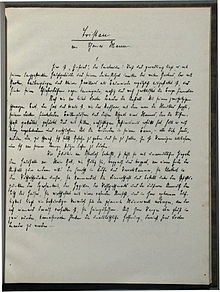
Wilhelm Richard Wagner was a German composer, theatre director, polemicist, and conductor who is chiefly known for his operas. Unlike most opera composers, Wagner wrote both the libretto and the music for each of his stage works. Initially establishing his reputation as a composer of works in the romantic vein of Carl Maria von Weber and Giacomo Meyerbeer, Wagner revolutionised opera through his concept of the Gesamtkunstwerk, by which he sought to synthesise the poetic, visual, musical and dramatic arts, with music subsidiary to drama. He described this vision in a series of essays published between 1849 and 1852. Wagner realised these ideas most fully in the first half of the four-opera cycle Der Ring des Nibelungen.

Paul Thomas Mann was a German novelist, short story writer, social critic, philanthropist, essayist, and the 1929 Nobel Prize in Literature laureate. His highly symbolic and ironic epic novels and novellas are noted for their insight into the psychology of the artist and the intellectual. His analysis and critique of the European and German soul used modernized versions of German and Biblical stories, as well as the ideas of Johann Wolfgang von Goethe, Friedrich Nietzsche, and Arthur Schopenhauer.
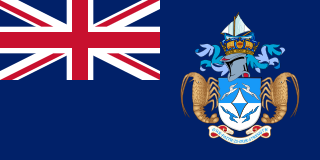
Tristan da Cunha, colloquially Tristan, is a remote group of volcanic islands in the South Atlantic Ocean. It is the most remote inhabited archipelago in the world, lying approximately 2,787 kilometres (1,732 mi) from Cape Town in South Africa, 2,437 kilometres (1,514 mi) from Saint Helena, 3,949 kilometres (2,454 mi) from Mar del Plata in Argentina, and 4,002 kilometres (2,487 mi) from the Falkland Islands.

Tristan und Isolde, WWV 90, is an opera in three acts by Richard Wagner to a German libretto by the composer, based largely on the 12th-century romance Tristan and Iseult by Gottfried von Strassburg. It was composed between 1857 and 1859 and premiered at the Königliches Hoftheater und Nationaltheater in Munich on 10 June 1865 with Hans von Bülow conducting. Wagner referred to the work not as an opera, but called it "eine Handlung".

A novella is a narrative prose fiction whose length is shorter than most novels, but longer than most novelettes and short stories. The English word novella derives from the Italian novella meaning a short story related to true facts.

Hans Theodor Woldsen Storm, commonly known as Theodor Storm, was a German-Frisian writer and poet. He is considered to be one of the most important figures of German realism.
Tristan da Cunha is part of the British overseas territory of Saint Helena, Ascension and Tristan da Cunha and has a history going back to the beginning of the 16th century. It was settled by men from military garrisons and ships, who married native women from Saint Helena and the Cape Colony. Its people are multi-racial, descended from European male founders and mixed-race and African women founders.

Tristan, also known as Tristram, Tristyn or Tristain and similar names, is the hero of the legend of Tristan and Iseult. In the legend, he is tasked with escorting the Irish princess Iseult to wed Tristan's uncle, King Mark of Cornwall. Tristan and Iseult accidentally drink a love potion during the journey and fall in love, beginning an adulterous relationship that eventually leads to Tristan's banishment and death. The character's first recorded appearance is in retellings of British mythology from the 12th century by Thomas of Britain and Gottfried von Strassburg, and later in the Prose Tristan. He is featured in Arthurian legends, including the seminal text Le Morte d'Arthur, as a skilled knight and a friend of Lancelot.

Gottfried von Strassburg is the author of the Middle High German courtly romance Tristan, an adaptation of the 12th-century Tristan and Iseult legend. Gottfried's work is regarded, alongside the Nibelungenlied and Wolfram von Eschenbach's Parzival, as one of the great narrative masterpieces of the German Middle Ages. He is probably also the composer of a small number of surviving lyrics. His work became a source of inspiration for Richard Wagner's opera Tristan und Isolde (1865).
The original Tristan chord is heard in the opening phrase of Richard Wagner's opera Tristan und Isolde as part of the leitmotif relating to Tristan. It is made up of the notes F, B, D♯, and G♯:
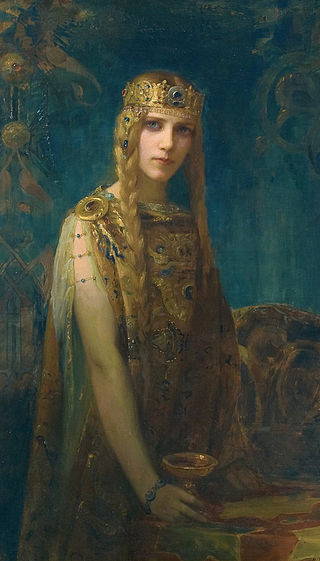
Iseult, alternatively Isolde and other spellings, is the name of several characters in the legend of Tristan and Iseult. The most prominent is Iseult of Ireland, the wife of Mark of Cornwall and the lover of Tristan. Her mother, the queen of Ireland, is also named Iseult. The third is Iseult of the White Hands, the daughter of Hoel of Brittany and the sister of Kahedin.

Legends of the Fall is a 1994 American epic Western drama film directed by Edward Zwick, and starring Brad Pitt, Anthony Hopkins, Aidan Quinn, Julia Ormond and Henry Thomas Based on the 1979 novella of the same title by Jim Harrison, the film is about three brothers and their father living in the wilderness and plains of Montana in the early 20th century and how their lives are affected by nature, history, war, and love. The film's time frame spans nearly 50 years from the early 20th century; World War I, through the Prohibition era, and ending with a brief scene set in 1963. The film was nominated for three Academy Awards and won for Best Cinematography. Both the film and book contain occasional Cornish language terms, the Ludlows being a Cornish immigrant family.
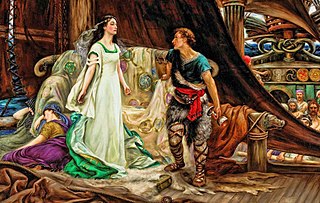
Tristan and Iseult, also known as Tristan and Isolde and other names, is a medieval chivalric romance told in numerous variations since the 12th century. Based on a Celtic legend and possibly other sources, the tale is a tragedy about the illicit love between the Cornish knight Tristan and the Irish princess Iseult in the days of King Arthur. It depicts Tristan's mission to escort Iseult from Ireland to marry his uncle, King Mark of Cornwall. On the journey, Tristan and Iseult ingest a love potion, instigating a forbidden love affair between them.

Fire and Sword is a 1981 romantic drama film directed by Veith von Fürstenberg. It is based on the legend of Tristan and Isolde, played by Christoph Waltz and Antonia Preser. Leigh Lawson and Peter Firth also star. Set during a raging war between Cornwall and Ireland, the film explores themes on conflict between magic and religion, violence, and destruction.
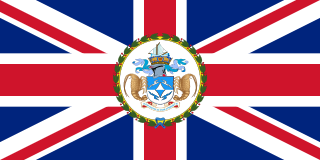
The governor of Tristan de Cunha is the representative of the monarch in Tristan da Cunha, a constituent part of the British Overseas Territory of Saint Helena, Ascension and Tristan da Cunha. The governor is appointed by the monarch on the advice of the British government. The role of the governor is to act as the de facto head of state.
Tristan is a Knight of the Round Table in Arthurian legend.
"Liebestod" is the title of the final, dramatic music from the 1859 opera Tristan und Isolde by Richard Wagner. It is the climactic end of the opera, as Isolde sings over Tristan's dead body.

Saint Helena, Ascension and Tristan da Cunha is a British Overseas Territory located in the South Atlantic and consisting of the island of Saint Helena, Ascension Island, and the archipelago of Tristan da Cunha. Its name was Saint Helena and Dependencies until 1 September 2009, when a new constitution came into force, giving the three islands equal status as three territories, with a grouping under the Crown.

The Tristan Quilt, sometimes called the Tristan and Isolde Quilt or the Guicciardini Quilt, is one of the earliest surviving quilts in the world. Depicting scenes from the story of Tristan and Isolde, an influential romance and tragedy, it was made in Sicily during the second half of the 14th century. There are at least two extant sections of the quilt, one of which is displayed in the Victoria and Albert Museum's Medieval and Renaissance Galleries, and the other in the Bargello in Florence. A third quilt, also depicting Tristan and Isolde, but not thought to be part of the V&A and Bargello examples, is held in private hands. The Tristan Quilts are the only known surviving intact examples of medieval quilts.
Peter von Staufenberg is a Middle High German verse novella in 1,192 lines. It was written around 1310 by Egenolf von Staufenberg.

